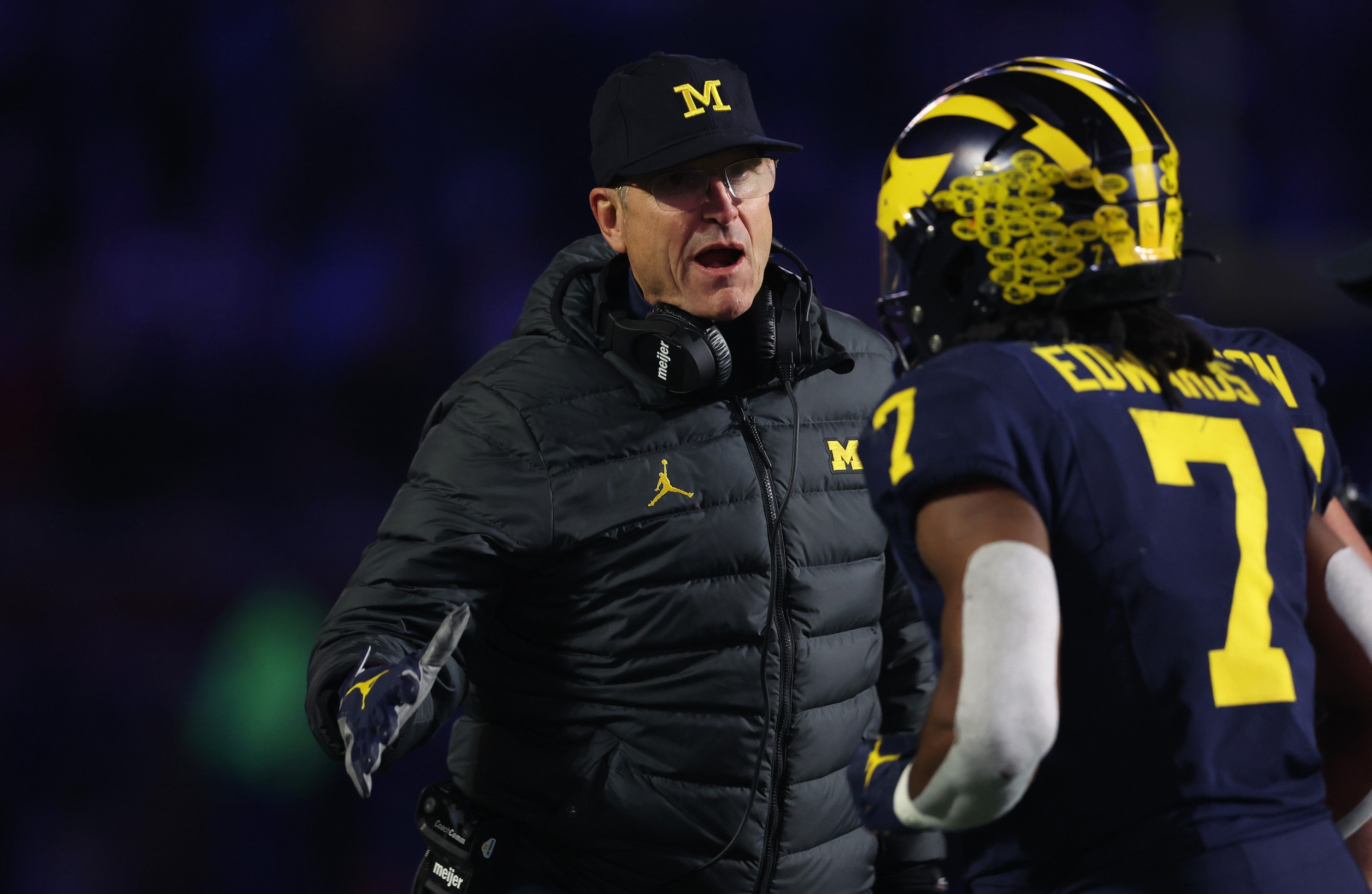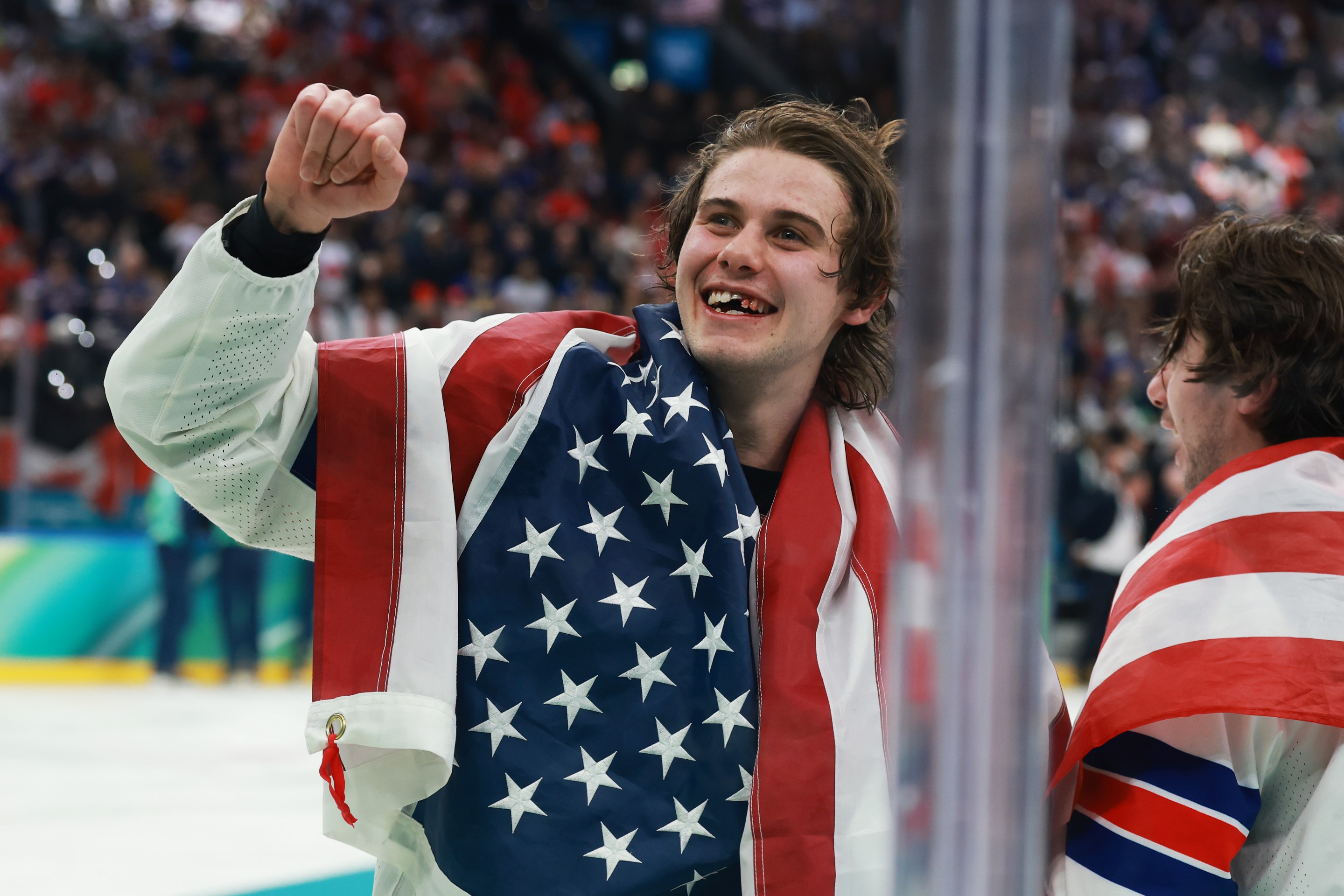Now that Connor Stalions has passed from this realm of existence and become the lead character in an Adult Swim pilot, the University of Michigan must step into the breach created by his departure. Stalions is already a legend, a ghost, a vacuum-reselling figure of myth; it is now on the institution to keep this already grandiose sign-stealing story alive.
We have already filled our boots with Stalions stories because one can never guarantee how long a shelf life a great American character will have; Better Call Saul ran for six seasons before it ran up the backside of Breaking Bad's story arc. But Michigan is still fighting the good fight in defense of the three core pillars of American law: due process, equally applied rules, and "Fuck you, we're rich." As it is said in the new (and also the old) world of college football, if you ain't embarrassing yourself, you ain't tryin'.
So far, so good. People from all around the Michigan Football Universe are taking up for the program, pro bono, including one fan on Mgoblog.com who blogged a fair chunk of Jim Harbaugh's lawyers' arguments that the NCAA in legal parlance ain't got shit on the Wolverines. Now it may be that the fan actually was given the lawyers' arguments in advance, or that Harbaugh's lawyers take submissions from the world's largest studio audience in an act of spectacularly self-parodic theatre. Either way Harbaugh's legal team runs in the hundreds of thousands of people, and most of them aren't asking for even as much as a Jimmy John's gift card in payment.
Another example of this you-didn't-ask-me-but strategy of defending the football team’s right to use Stalions while simultaneously letting him twist in the wind of unemployment (vacuum cleaner sales being a notoriously volatile business) comes in the form of a missive found in the Yale Journal Of Regulation from someone purporting to be Daniel A. Crane, a law professor at the U of M. We don't doubt that Crane is who he says he is, but Stalions has set an extremely high bar for "trust but verify."
Anyway, the law professor put fingers to keyboard, or gave dictation to someone to do it for him, to declare that the rule Stalions broke on behalf of his lord and savior Jim Harbaugh isn't actually a rule at all. Or, if it is a rule, then the NCAA or Big 10 Conference have no jurisdiction over his behavior. And if the NCAA and the B1G have no jurisdiction, then there isn't anyone to complain to about it. And if there is no provably wronged party, then nothing happened here. This would be subparagraph 6 in the "Fuck you, we're rich" clause.
Crane put some time and work into this, so let's give him his stage, starting with his grandiloquent dropping of "tu quoque" in the first paragraph. Clearly, Prof. Crane is not donkeying around here. If he were, he would just have said "those bastards did it, too" even though that casually insulting level of colloquialism is entirely too downmarket for a Michigan Man. Anyway, here’s the professor:
As anyone who follows college football is aware, the University of Michigan is under investigation from the NCAA and Big 10 Conference for “sign stealing”—gathering information on future opponents’ play signals. Given Michigan’s national title aspirations, the potential for sanctions is obviously bad news. Michigan has now fired back with evidence that three other Big 10 teams—Rutgers, Ohio State, and Purdue—shared Michigan’s signs. Tu quoque aside, it turns out that sign stealing isn’t prohibited by NCAA rules. Rather, the issue is whether Michigan (or other teams) violated NCAA Bylaw 11.6.1 that prohibits “off-campus, in-person scouting of future opponents (in the same season).”
Before turning to the antitrust issues raised by enforcement of that rule, let me make it clear that, although I am employed by the University of Michigan, I do not represent it. These comments are solely my personal opinion. Further, although I of course don’t want Michigan to be penalized, I also would not want the Maize and Blue, or anyone else, to get away with cheating. Fair is fair, and foul is foul.
If this looks to you like the sort of thing that precedes a personal opinion from someone who is just beginning to realize how much they actually want the Maize and Blue to get away with cheating, what follows will not surprise you much. If it also looks something like a parody of how a Michigan Man might handle that sort of uncomfortable experience, then you very much have been paying attention. The professor continues:
But the “cheating” question goes to the core of the antitrust issue. As already mentioned, there apparently isn’t any rule about gathering intelligence on an opponent’s signs. If a school can do that by reading lips from a TV screen, more power to them. The relevant rule isn’t about the integrity of the game like 11 men on the field or ineligible receivers. According to MLive, the rule was adopted in 1994 “as a cost-cutting measure designed to promote equity for programs that couldn’t afford to send scouts to other games.” In other words, if Michigan has cheated, it has cheated on a financial rule rather than one concerning the game itself.
Enter antitrust law. In recent years, NCAA rules that limit economic competition by member schools have been in serious antitrust trouble. In 2021, the Supreme Court unanimously held that the NCAA’s enforcement of rules limiting member school compensation of student athletes up to the full cost of their education violates Section 1 of the Sherman Act. National Collegiate Athletic Ass’n v. Alston, 141 S. Ct. 2141 (2021). Six years earlier, the Ninth Circuit reached a similar decision regarding NCAA’s restrictions on student athlete name, image, and likeness rights. O’Bannon v. National Collegiate Athletic Ass’n, 802 F.3d 1049 (9th Cir. 2015). In the more distant past, the Supreme Court held that NCAA limitations on television broadcasting violated the Sherman Act. National Collegiate Athletic Assn. v. Board of Regents of Univ. of Okla., 468 U.S. 85 (1984). The common thread of these cases is that NCAA rules that limit member schools from freely determining how to allocate their resources can run afoul of the antitrust laws, even if (or perhaps because) those rules are designed to achieve intercollegiate economic parity.
To the extent that Bylaw 11.6.1 is intended to prevent schools from competing economically by determining how much to spend on their athletic programs, it runs squarely into Alston, O’Bannon, and Board of Regents. The NCAA or Big 10 might have a shot at justifying the rule as equalizing economic expenditures among member schools in order to promote competitive balance. The NCAA has made such arguments in the past, and in O’Bannon the Ninth Circuit accepted that promoting competitive balance may be a legitimate procompetitive justification in theory. The problem is that the courts have rejected the competitive balance justification in practice. See, Alston, 141 S. Ct. at 2152 (observing that NCAA had unsuccessfully attempted to justify its player compensation rules as promoting competitive balance); O’Bannon, 802 F.3d at 1072 (“We [] accept the district court’s factual findings that the compensation rules do not promote competitive balance.”). Anyone trying to justify Bylaw 11.6.1 as promoting competitive balance will have an uphill climb.
This is a bad time for the NCAA or Big 10 to be rattling antitrust cages. The courts are already grumpy with NCAA rules that limit economic competition, and the Justice Department has shown a heightened interest in antitrust issues in sports. The sign stealing scandal may be fodder for either jokes or righteous (hypocritical?) indignation for now, but it could unleash something that no one in the NCAA or Big 10 would want. Caveat emptor.
And there you have it—"tu quoque" going in and "caveat emptor" coming out. Them's Latin fightin' words, all wrapped around a freelance defense for the university that centers around the historical legal argument, "You ain't got nothin', punk. We'll turn you into a donut shop by Christmas." Sure Crane uses antitrust law as the tentpole for his argument, but mostly he just laughs at the NCAA's lousy record in the courts, which is less a legal point than a statement that boils down to calling the NCAA bumbling goofs. Which is in and of itself unassailable reasoning.
But the most compelling part of this argument comes before the argument even begins. It’s in Crane’s caveat that “although I of course don’t want Michigan to be penalized,” he also does not want to see anyone “get away with cheating.” It’s the principle of the thing that matters, with said principle having less to do with cheating than Michigan’s right not to be called on it. And Crane's an objective observer here, as proven by his use of the legal term "Maize and Blue."
All of which we mention only because this is what the current college sports revolution is all about—not just "if you ain't cheatin' you ain't tryin'" but "if the cops ain't there to stop you from doin' it, it ain't cheatin' at all." In this sense, Connor Stalions is the Robin Hood of our age—stealing from Rutgers to give to the Maize and Blue, not because it’s just or virtuous but because there is nothing stopping him from doing it. If those ingrates at Ann Arbor don't name a corporate espionage endowment after him, or at the very least sell balaclavas embroidered with "I'm With Connor" at Michigan Stadium, the NCAA and Big 10 should step in and make it happen. After all, you have to have a code, even when your gig is denying that the code can stand up in court.






